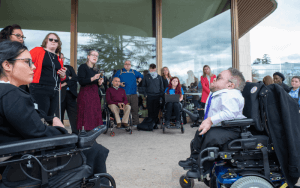New figures obtained by a disabled people’s organisation – after ministers refused to commission the work themselves – appear to show how the government relies on the growth in self-employment and part-time jobs to exaggerate its success in increasing disability employment.
Ministers such as work and pensions secretary Esther McVey (pictured) have repeatedly boasted of how their policies have led to hundreds of thousands more disabled people in work over the last five years.
But those claims have been based on figures provided by the Office for National Statistics (ONS), which includes in its measure of “employment” people who are in part-time work, are self-employed, or are on government training and jobs programmes.
Ministers in the Department for Work and Pensions (DWP) refused to commission work from ONS – which it told Disability News Service would cost just £125 (plus VAT) – that would show the full, detailed figures.
Now London’s pan-disability disabled people’s organisation Inclusion London has commissioned the work itself from ONS, at the same price of £125 plus VAT.
The new ONS figures* obtained by Inclusion London show that nearly half of the increase in disability employment in the last four years has been due to disabled people becoming self-employed or taking part-time jobs.
Between 2013-14 and 2017-18, the number of full-time disabled employees rose by about 383,000, while the number of disabled people in part-time jobs, self-employment, government training programmes and employed as unpaid family workers increased by about 366,000.
During this period, the number of disabled people in self-employment increased by more than 22 per cent, when the number of non-disabled people who were self-employed rose by just nine per cent.
The increase in the number of disabled people in part-time self-employment increased even faster, by about 25 per cent.
There was, though, also a sharp increase of about 22.5 per cent in full-time disabled employees over the four years, although the number of part-time disabled employees rose even faster, by about 27.5 per cent.
Ellen Clifford, campaigns and policy manager for Inclusion London, pointed to the high number of disabled people who had become self-employed.
She said: “Research by the New Economics Foundation in 2017 found more than half of all self-employed people don’t make a decent living.
“This is even more of an issue for disabled people, whose outgoings tend to be much higher due to unavoidable impairment-related expenditure.
“Anecdotally we have heard about disabled people feeling pressured by their jobcentre to consider becoming self-employed.”
Clifford also highlighted the high proportion of disabled people who have taken part-time jobs.
She said: “This will include things like zero hours contracts which can again easily fail to provide the security, conditions and income levels that disabled people need.
“Studies have confirmed that unsuitable employment is worse for people’s health than no employment.”
She urged the government to “look at the types of jobs and work that disabled people are moving or potentially being pushed into and to address issues of quality instead of making the aim to get people off out-of-work benefits at any cost”.
Linda Burnip, co-founder of Disabled People Against Cuts (DPAC), said DWP had yet again “botched” its analysis of statistics.
She said: “Disabled people are particularly over-represented amongst the self-employed and as most people are aware, self-employment is often a route to employment taken by those excluded from mainstream labour markets.
“The Association of Independent Professionals and the Self Employed (IPSE) have revealed that self-employed workers [can end up] £3,000 per annum worse off than those in employment with the roll-out of universal credit and are calling on the government, like DPAC, to stop this roll-out.
“They highlight too the instability of income that self-employment creates and the negative impact this has on the wellbeing of those working in this sector.”
A DWP spokeswoman declined to comment about the part-time work figures and whether the government agreed with calls to look at the types and quality of work disabled people are moving into.
But she said: “We welcome recent increases in the disability employment rate, with 600,000 more disabled people in work between 2013 and 2017.
“This analysis shows that employment and self-employment for disabled people both increased by around a fifth between 2013-14 and 2016-17.”
*It is not possible to compare today’s figures with 2009-10, before the Conservative-led coalition came to power, because of a change in in 2013 in how the survey data ONS uses to calculate its figures was collected
A note from the editor:
Please consider making a voluntary financial contribution to support the work of DNS and allow it to continue producing independent, carefully-researched news stories that focus on the lives and rights of disabled people and their user-led organisations.
Please do not contribute if you cannot afford to do so, and please note that DNS is not a charity. It is run and owned by disabled journalist John Pring and has been from its launch in April 2009.
Thank you for anything you can do to support the work of DNS…

 UN’s ‘damning verdict’ is ‘vindication’ of fightback against government’s rights violations
UN’s ‘damning verdict’ is ‘vindication’ of fightback against government’s rights violations Direct action ‘will put stake through the heart’ of government scapegoating of disabled people
Direct action ‘will put stake through the heart’ of government scapegoating of disabled people Mayor’s stats show failure to enforce his own accessible housing standards
Mayor’s stats show failure to enforce his own accessible housing standards